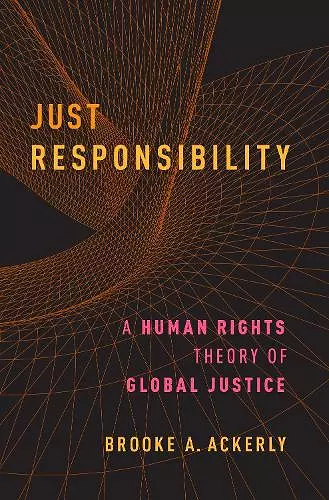Just Responsibility
A Human Rights Theory of Global Justice
Format:Hardback
Publisher:Oxford University Press Inc
Published:5th Apr '18
Currently unavailable, and unfortunately no date known when it will be back
This hardback is available in another edition too:
- Paperback£35.49(9780190662943)

It has been well-established that many of the injustices that people around the world experience every day, from food insecurity to unsafe labor conditions and natural disasters, are the result of wide-scale structural problems of politics and economics. These are not merely random personal problems or consequences of bad luck or bad planning. Confronted by this fact, it is natural to ask what should or can we do to mitigate everyday injustices? In one sense, we answer this question when we buy the local homeless street newspaper, decide where to buy our clothes, remember our reusable bags when we shop, donate to disaster relief, or send letters to corporations about labor rights. But given the global scale of injustices related to poverty, environmental change, gender, and labor, can these individual acts really impact the seemingly intractable global social, political, and economic structures that perpetuate and exacerbate them? Moreover, can we respond to injustices in the world in ways that do more than just address their consequences? In this book, Brooke A. Ackerly both answers the question of what should we do, and shows that it's the wrong question to ask. To ask the right question, we need to ground our normative theory of global justice in the lived experience of injustice. Using a feminist critical methodology, she argues that what to do about injustice is not just an ethical or moral question, but a political question about assuming responsibility for injustice, regardless of our causal responsibility and extent of our knowledge of the injustice. Furthermore, it is a matter that needs to be guided by principles of human rights. As she argues, while many understand human rights as political goals or entitlements, they can also guide political strategy. Her aims are twofold: to present a theory of what it means to take responsibility for injustice and for ensuring human rights, as well as to develop a guide for how to take responsibility in ways that support local and global movements for transformative politics. In order to illustrate her theory and guide for action, Ackerly draws on fieldwork on the Rana Plaza collapse in 2013, the food crisis of 2008, and strategies from 125 activist organizations working on women's and labor rights across 26 countries. Just...
Ackerly locates the starting point for global justice in the everyday experience of those suffering injustice and their struggle against injustice. She sets out several reasons for this, the most important of which is understanding, and acting to correct, injustice is a difficult task always done under conditions of incomplete and imperfect information; as a consequence, to accurately know or combat injustice the experience of those suffering injustice should have a privileged position in relation to abstract theorising. Given injustice is encountered in the actual world of everyday experience, we require a theory of global justice connected to the everyday. * Joe Hoover, Queen Mary University of London, UK *
[T]he main contributions of Just Responsibility are the methodology that Ackerly articulates and illustrates; the practical nature of her conclusions; and her distillation of the construction and maintenance of social epistemologies. * Karie Cross Riddle, Calvin College, The Review of Politics *
- Winner of Winner of the American Political Science Association's 2019 Victoria Schuck Award.
ISBN: 9780190662936
Dimensions: 163mm x 236mm x 23mm
Weight: 584g
314 pages